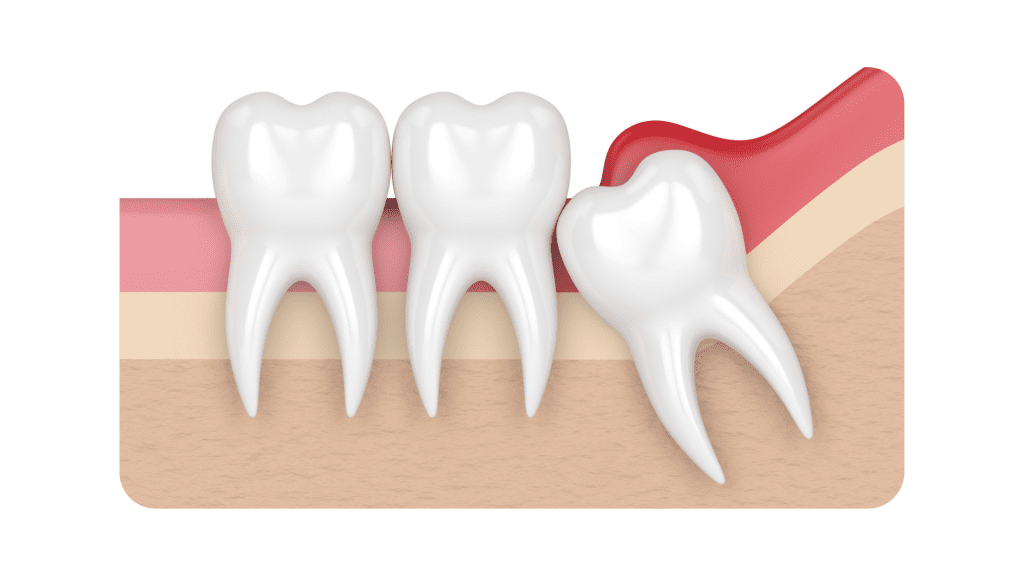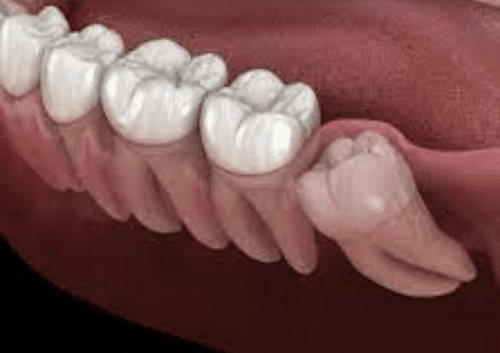
You’ve had your wisdom teeth removed. What do you do now?!? Well, we've put together a detailed list of the top ten things you need to do for the recovery of your wisdom teeth, based on facts, experience, and statistics.
Whether they are in the mouth erupting or at the dentist's office being pulled, wisdom teeth are infamous for being difficult to deal with because of their tenacious and difficult nature. The majority of us, as a result of the skeletal evolution that has occurred in our skulls over the course of centuries, do not have the arch space necessary for all four of these third molars to emerge.
When there is insufficient room in the oral cavity for the wisdom teeth to erupt, these molars can lead to a number of unpleasant consequences, such as swollen gums, infections, facial swelling, damage to other teeth, and even problems with the jaw joint because of the wisdom teeth.
Wisdom teeth inherently are more likely to cause issues. This is due to the fact that they are the final molars to erupt from your mouth. Even worse, they can move teeth, frequently undoing the progress made in orthodontic treatment that had started or is now being carried out. Therefore, there is no alternative to have these teeth extracted when the dentist advises they ought to be done so.
In spite of the fact that recovery from oral surgery has a reputation for being excruciatingly painful and miserable, the majority of the time, the cause of such stress is due to the patient's disregard for aftercare and their lack of knowledge regarding how to properly manage the open extraction site.
As a result, we have developed a detailed list of the top ten things you absolutely need to do for recovery, based on facts, experience, and statistical evidence. Continue reading the following instruction list if you want to understand how to minimize issues after surgery and lessen the amount of post-operative discomfort you experience after having your wisdom teeth out.
1. You must not spit.

Immediately after having a wisdom teeth out, it is possible for blood and saliva to collect in the mouth. At the same time, the body's natural defense mechanism creates a blood clot at the extraction site to act as a plug, which stops the bleeding and allows the body to begin the healing process. Blood and Saliva must be removed from your mouth with care. Spitting can create a vacuum in your mouth that prevents the healing process from occurring. This could in turn dislodge a healing blood clot.
Removal of the saliva and blood must be done in order to prevent the blood clot from becoming dislodged. It is recommended that you accomplish this by slightly opening your mouth over a sink and allowing blood and saliva to come out while tilting your head forward. You should do this with your head cocked forward. By dislodging the naturally occurring blood clot in the extraction area, a suction pressure formed in the mouth can have serious effects including a dry socket.
2. Straws are not your friend.
In light of what has been discussed so far, it is of the utmost significance to maintain the integrity of the blood clot. One of the ways in which this can be accomplished is by refraining from using straws following the surgery until the wound has healed. It is important to avoid using straws because, similar to spitting, they produce a suction pressure in the mouth that need to be avoided.
3. Consume Foods That Are Mild and Chilled.
Post-surgery It is recommended that you wait at least 24 hours following the extraction before consuming anything that is either extremely hot or extremely cold. Most dentists advise consuming slightly melted ice cream for a cooling effect following the removal of wisdom teeth on the same day. Consuming foods that are tender, lukewarm to slightly cold, and require very little effort to chew are typically regarded as the healthiest way to take in nutrition. Foods such as: Yogurt, soup (warm but not hot, bread that is soft, bananas, pudding, mashed potatoes and vegetables, porridge, applesauce., etc.
After the treatment, it's crucial to chew slowly to avoid biting your cheek or lip, which can still be numb from the anesthetic. When eating, make an effort to chew on the side of the mouth that is not the extraction site. The side of the mouth where the extraction site is located should not be used to chew. It is also recommended that you stay away from hot beverages such as coffee and tea for the first twenty-four hours after the procedure; however, these beverages can be consumed warm. Following surgery, it is best to stick to a soft diet for at least the first 48 hours after the procedure.
4. Use Warm Saltwater Rinses
After an interval of twenty-four hours has passed since the extraction procedure, you should now start rinsing your hair with saltwater. To accomplish this, first bring one cup of tap water to a simmer, then add one level teaspoon of salt and whisk it into the water until the salt is completely dissolved. Rinse your mouth out gently with the salt solution, keeping it there for one minute while you swish it around in your mouth.
Infections can be avoided, food can't get stuck in places of the mouth that are difficult to brush with a toothbrush, irritated tissues in the mouth can be soothed, and the gums can be made more comfortable by supporting faster healing thanks to saltwater rinses. Additionally, saltwater rinses might prevent food from getting stuck in parts of the mouth that would be difficult to brush with a toothbrush. You should strive to perform this activity at least three to four times per day for around one week, particularly after each meal.
5. Stay away from cigarette and alcohol smoke.
Both smoking and drinking alcohol should be avoided on the day of operation and for the first twenty-four hours after it. The decreased blood circulation that results from smoking can have a negative impact on the healing process. The presence of smoke in the mouth can both hasten and slow the healing process of wounds, which may increase the risk of infection if a blood clot has been disrupted or has not yet formed. Consuming alcohol is discouraged as well because of the unfavorable effect that it has on the wound site, which can lead to additional issues, including infections.
6. Make Sure You Get Your Medications on Time
Taking your prescribed medications exactly as directed and on time can be one of the most effective strategies to alleviate the pain and discomfort that are invariably associated with the extraction of wisdom teeth. The most effective method of pain management is to take painkillers at the appropriate times so that the therapeutic action of the medication is maintained in a consistent and steady manner. By sticking to the program, one is able to experience less distress and a more effective therapeutic effect.
7. Cover the Area with Ice
It has been claimed that applying an ice pack to the affected area of the cheek will help reduce inflammation, pain, and sometimes swelling as well. If you have cold intolerance or cold sensitivity, you should avoid using ice packs entirely and take care to moderately limit the amount of time spent icing as well as the length of time spent icing.
8. When you sleep, prop your head up on some pillows.
It is recommended that you sleep with your head elevated for the first few nights after the treatment to prevent blood from accumulating in the area where your wisdom teeth used to be. This will prevent infection from occurring. If you don't do it, the wound can start to throb, which would be very uncomfortable.
9. Avoid Strenuous Exercise
It is recommended by the American Dental Association (ADA) that intense activity be avoided for at least twenty-four hours after an extraction treatment. This is done to reduce the risk of post-operative bleeding and to minimize the risk of blood clot dislodgement.
10. Keep Your Scheduled Appointment for a Checkup!
It is necessary to check and follow up with your dental practitioner at the time allotted to you, especially if you have had any stitches inserted so that they may be removed. In this case, it is very important to do so so that the stitches can be removed. If you experience significant bleeding, increased pain after surgery, a foul taste or odor in the mouth, and fever while you are recovering from dental surgery, you need to schedule an appointment with your dentist as soon as possible.
At Summerlin Dental Solutions, Awareness Is the First Step Towards Improved Care
The first step in responsible management is having a good understanding of how to maintain your extraction site. It is imperative that you make every effort and take every necessary step to carefully adhere to your dental practitioner's medical advise and to put into practice procedures that will hasten the healing process. If you deviate from these recommendations, you run the risk of developing an infection after surgery or having a hemorrhage, both of which would further complicate and delay the healing process, not to mention increase the amount of pain and discomfort you experience. A speedy recovery is guaranteed when one is careful and attentive when following aftercare guidelines.
CLICK HERE TO SCHEDULE YOUR APPOINTMENT!
GET TO KNOW YOUR BEST DENTIST IN SUMMERLIN
Dr. Marianne Cohan was voted The Best Dentist/ Dental Office and Best Cosmetic Dentist from The Las Vegas Review-Journal in 2020 and 2021. She received her Doctor of Dental Surgery (DDS) from the State University of New York at Buffalo in 1992.

With an emphasis on cosmetic dentistry, complete makeovers, and implant dentistry, Dr. Cohan is committed to continuing education and feels that we never stop learning. Dr. Cohan takes pride in using high-powered magnification to perform minimally invasive restorative dentistry. She uses all the latest technological advances including digital radiography, digital photography, computer simulations, and high-resolution pictures of your proposed treatment on 55-inch screens. She also utilizes CBCT (cone beam) and laser technology.
Dr. Cohan is always available to her patients and is available for any dental emergency.